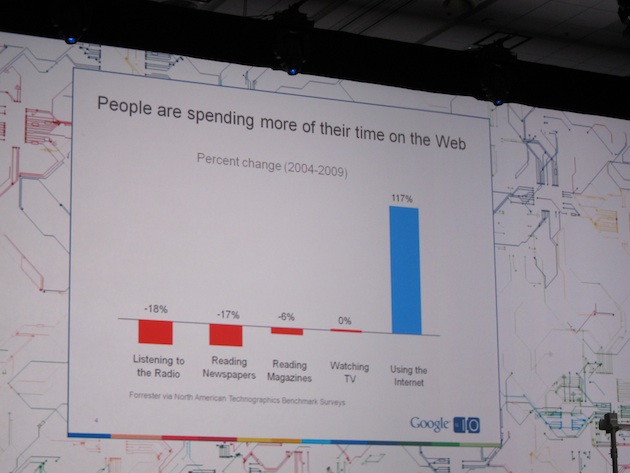Google, Android, and the Future of Games on the Web
Hello Unity developers!
I have some big news to share with you this week: today, we're showing two new branches of our technology to the world at Google's annual developer conference, Google I/O. The first is Unity Android, which we announced this spring. Though we've shown some sneak peeks at our Android support in private and at GDC in March, we've not yet shown all anything like what we're showing this week.
In the Developer Sandbox at the show, we have several Android demos running on two different devices. On Google's Nexus One, we have both Penelope and Star Troopers. We're also showing a couple demos running a new tablet device sporting Nvidia's Tegra 2 chipset: the alien shooter we demoed on the iPhone 3GS GDC and Star Troopers.
The Developer Sandbox also includes a station showing another Google technology which, experimentally for now, we've made Unity support. That technology is called Native Client and we think it's a potential game changer for rich web applications and games in particular. In a nutshell, Native Client is a security sandbox currently in Chromium that allows the secure execution of native code. If you want to dig into the details (e.g. how can native code be guaranteed secure?!), I *highly* recommend you watch Henry Bridge's explanation in this video.
If we really cut to the chase for why this matters for Unity, it's because what we're showing is Unity running in Chrome with no plugin at all. That's right, there's no Unity Web Player installed on the machines running Unity content in Chrome. Rather, with Google's clever technology, we're running Unity content in Chrome using just default access and no additional installation or user interaction. It's kind of wild!
Chrome's market share is already growing like a weed, but it's innovation like this that will keep driving adoption at a torrid pace. Even cooler still is the fact that all this new technology from Google is open source, so it can readily be adopted by other browsers if they want to. We think they should.
Unity's Native Client port got some very prominent attention outside the Developer Sandbox as well, appearing in the keynote by Google's Sundar Pichai this morning. Sundar showed Lego Star Wars in a mockup of the forthcoming Chrome Web Store. Though not fully public yet, the Chrome Web Store is being designed with games in mind, and we're sure that it can be yet another great channel for Unity developers to reach large audiences.
Some quick, semi-blurry shots from the keynote (captions are mine):

The Web is where people spend their time...

...but it's often really tough to find the best apps.

The Chrome Web Store will help organize the web's best content with an open marketplace and tools for rating and discovery.

High quality content, including content created with Unity, will be available to a huge audience with no technical or commercial barriers to entry. May the best content games win :)
I want to take a moment to say how fantastic it's been to collaborate with Google. For a giant company famously populated with geniuses, the people we've worked with have been incredibly humble, open, and responsive. No doubt about it, this is a sharp, ambitious, and capable crew and they want to do good things for game developers.
In that vein, it's no secret that Unity believes in the future of games on the web and mobile devices. We put the majority of our resources into charging ahead on these fronts. Both markets are relatively new, but they're now attracting new audiences to games and seeing very high, sustained growth rates as a result. As a game developer, being on the web and on mobile devices offers you the most frequent opportunities to capture a gamer's attention and in raw minutes, the greatest spans of time to entertain them. Because both mobile and web are largely open platforms, we feel Unity is providing the greatest value to you by staying at the leading edge of the curve. For developers, they are easy to enter and they unlock the largest audiences. Sounds like a winning combination to us!
At Unity, we also believe there's significant value in targeting multiple devices. Bigpoint had a great demo at GDC this spring, using Unity to create a game that could be played head-to-head, phone and browser. Whether it's offering complementary experiences between the web and mobile devices, or a truly seamless experience across both, we think it's valuable for developers to offer entertainment this way. And we're beginning to see that proven in many more cases by big and small developers alike.
We've been very pleased to discover that our goals – offering the best possible technology to help game developers succeed – are in fundamental alignment with both Android and Chrome. While we still think it's very important to continue to support all major browsers and as many mobile platforms as possible, we're very excited by the technological openness of Google's platforms and by the frictionless marketplace they're building to support them. This means low barrier to entry and high potential for game developers – exactly the right ingredients for games to flourish!
As I'm writing this, Google I/O just hitting stride for day 1. We will have a lot more to announce about this in the coming months, so stay tuned and we'll keep up to date on the latest and greatest. If you're attending the show, come by and see us in the Developer Sandbox. We're happy to answer questions at the show, or in the comments below this post.
Is this article helpful for you?
Thank you for your feedback!
- Unity Labs
- Copyright © 2024 Unity Technologies